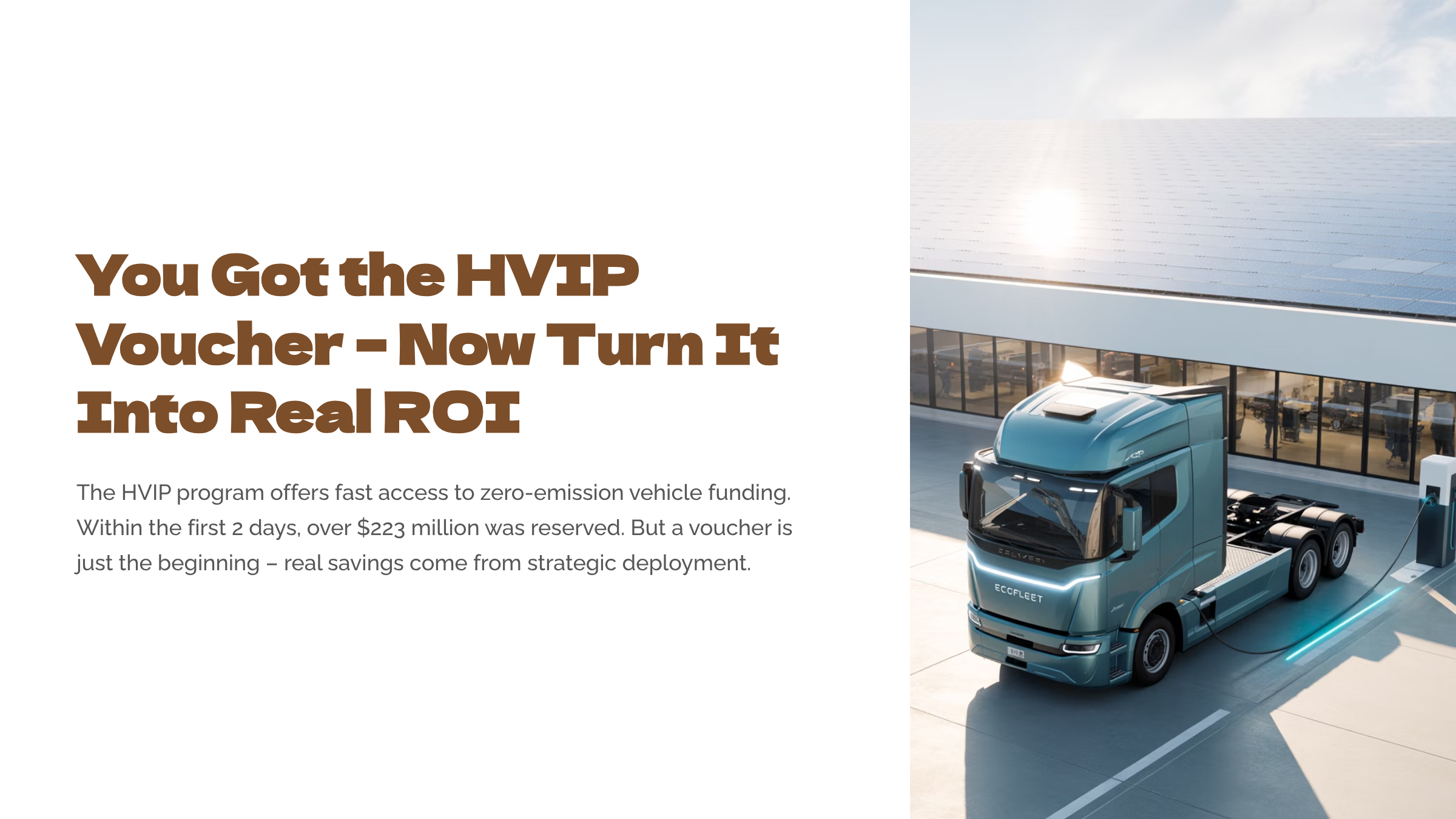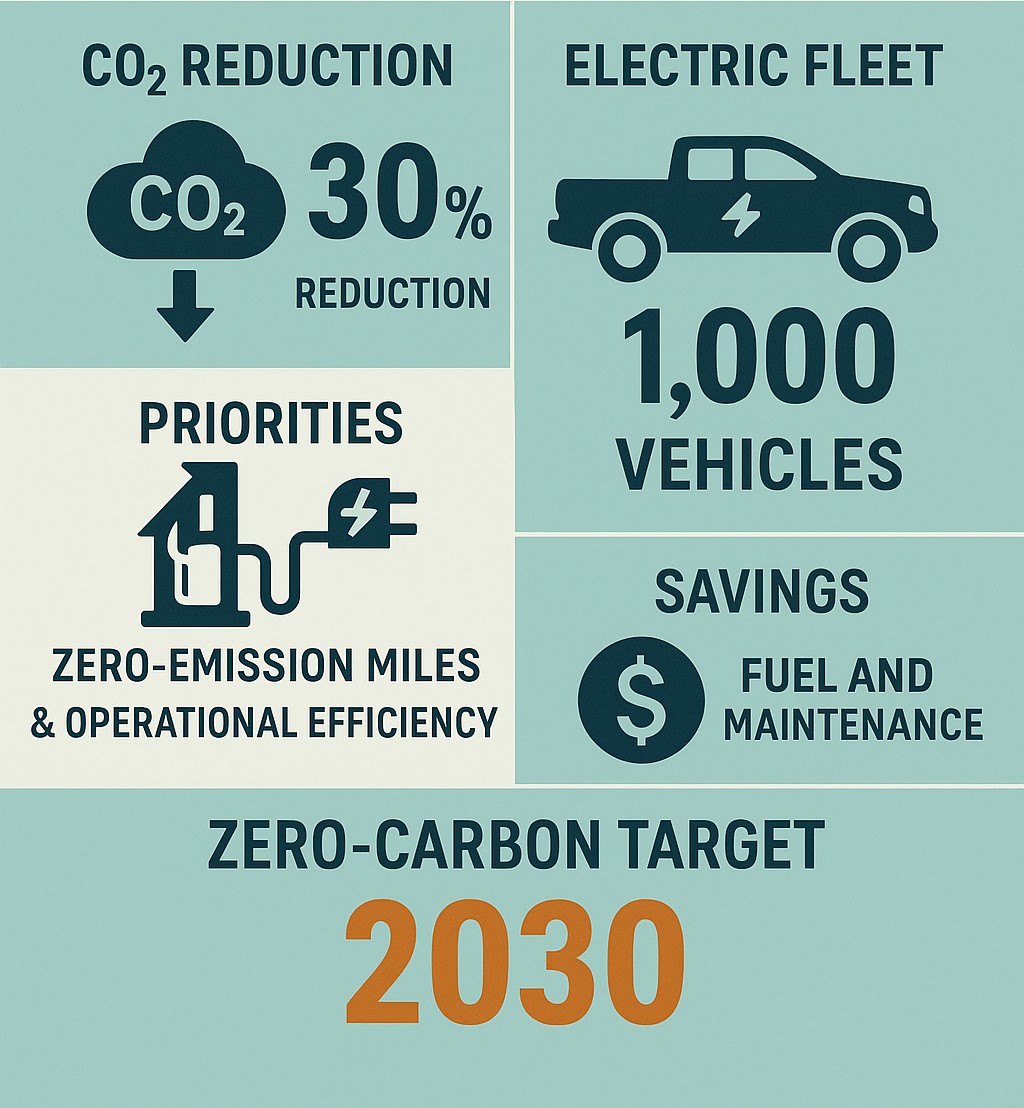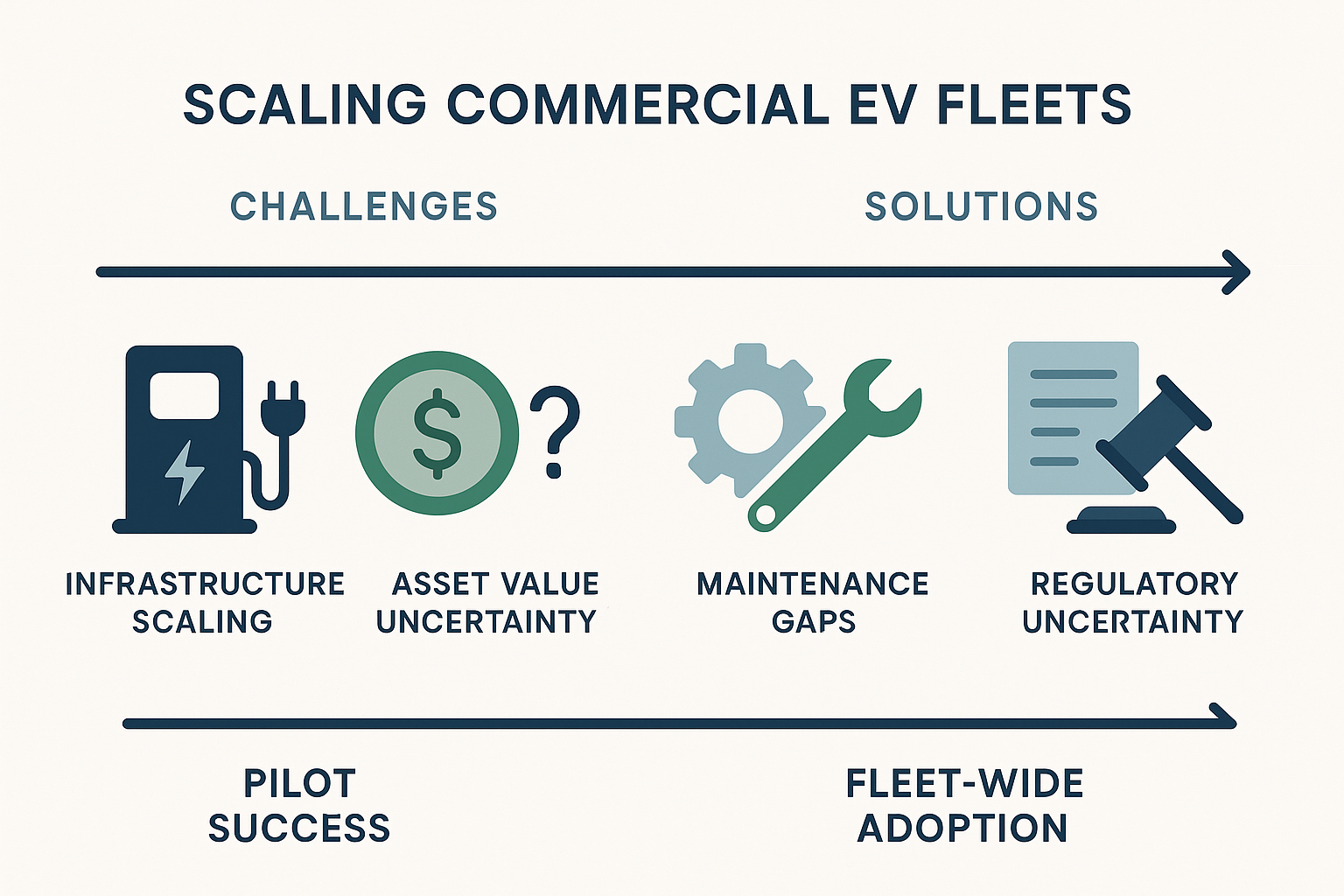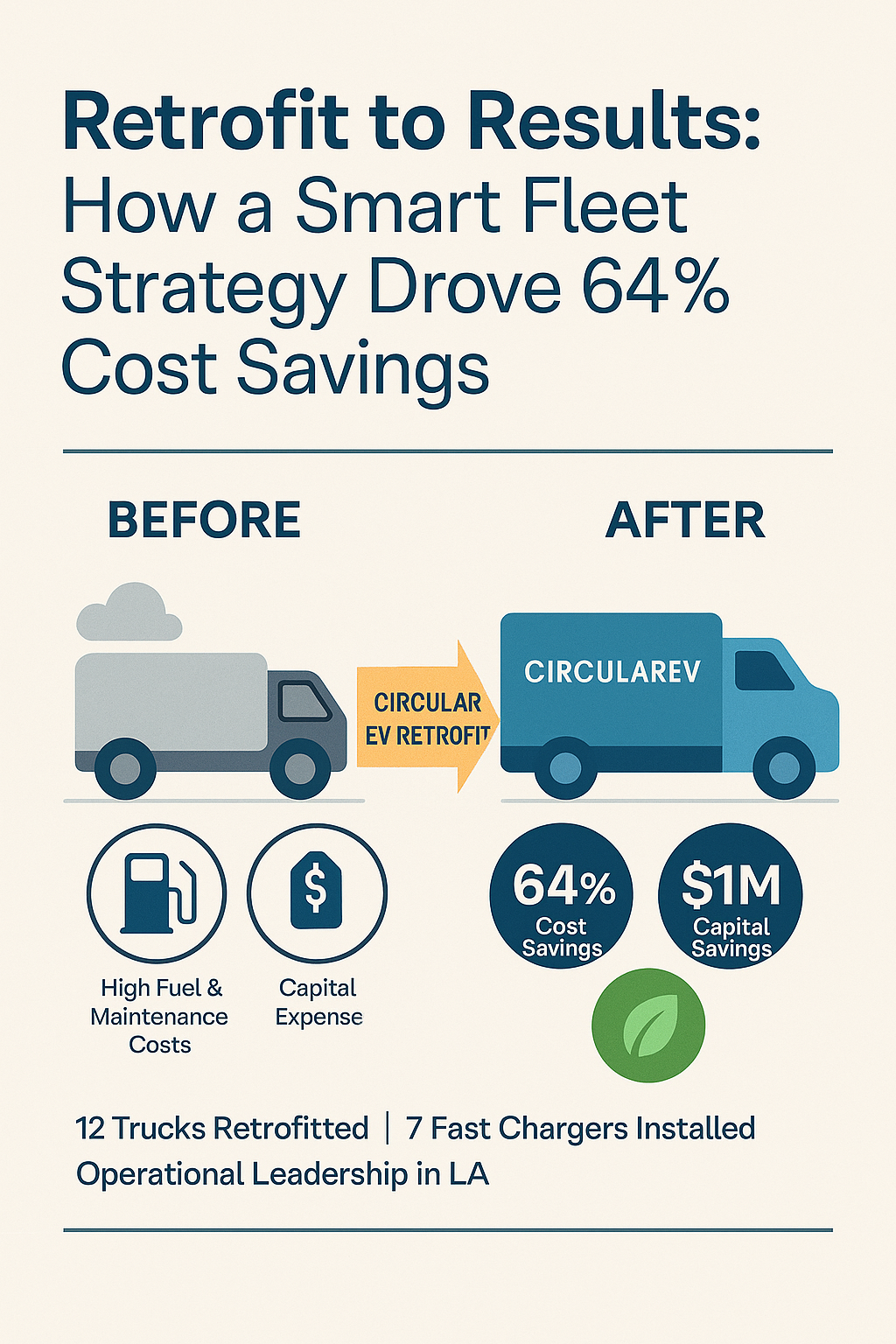The Lane with Leke Services
Read our perspectives that unpack key considerations for getting ahead of the mobility energy transition. Sign up here for the newsletter so you never miss a new post.
All Posts
.png)
Nigeria’s ₦44 Trillion Electric Vehicle Opportunity
Nigeria’s EV market is at an inflection point, with two- and three-wheelers leading near-term adoption thanks to lower operating costs, falling battery prices, distributed solar charging, and pro-investment policies; under reasonable use and willingness-to-pay assumptions, the total addressable market is estimated at ₦22–₦44 trillion annually, contingent on solving infrastructure, financing, skills, and data gaps through standards, bankable underwriting, and ecosystem coordination across vehicles, charging, and batteries.

Protecting Your HVIP Investment for the Long Run
A compliance checklist for the three-year post-award period covering OEM telematics reporting, California in-state operation thresholds, AB 794 labor attestation, annual usage surveys, and disciplined recordkeeping to prevent penalties and safeguard future eligibility.

You Got the HVIP Voucher – Now Here’s How to Turn It Into Real ROI
A fast, action-oriented guide to turning an HVIP award into ROI by sequencing infrastructure early, training drivers and technicians, updating routing and data workflows, and building compliance into procurement and ESG to avoid clawbacks and stranded assets.

Why California’s HVIP Program Is Worth It
California’s Hybrid and Zero-Emission Truck and Bus Voucher Incentive Project (HVIP) program can be complex, but its benefits—significant cost savings, flexible fleet upgrades, and broad eligibility—make it well worth the hassle for transportation businesses. This article presents several main points about the program.

Why You Should Electrify Now: Unlock Immediate 100% Tax Deductions with Better Planning
As federal EV tax credits face looming reductions, many fleet operators are questioning the timing of their electrification plans. Yet, right now may be the best moment to act. With powerful incentives like 100% bonus depreciation, increased Section 179 deductions, and remaining IRA credits still available, businesses can unlock significant tax savings, reduce upfront costs, and accelerate a more cost-effective transition to electric fleets.

EV Transition Cuts Fuel Expenses for 1000-Vehicle Fleet
Amid evolving regulations and market shifts, Sacramento Municipal Utility District (SMUD) continues to advance its zero-emission goals, achieving a 30% CO₂ reduction and growing its electric fleet to 13% of nearly 1,000 vehicles. By prioritizing zero-emission miles and operational efficiency over just vehicle count, SMUD reports tangible savings in fuel and maintenance.

What Happens After the Pilot?
Why most electrification efforts stall after successful pilots and how to break through

Electrification Value Pools
As fleets transition from combustion engines to electric drive-trains, the value landscape is shifting just as dramatically. No longer just about vehicles and fuel, today’s fleet management is being redefined by digital platforms, predictive systems, and new financial models. This article explores the emerging electrification value pools where gains can be made, how risks are managed, and why early adopters are poised to lead in an increasingly tech-driven ecosystem.

Frito-Lay Slashes Last-Mile Delivery Costs by 45% with Ford E-Transit Electric Vans
Frito-Lay North America has significantly cut last-mile delivery costs by 45% through the deployment of Ford E-Transit electric vans at its Manteca, California facility. This move underscores the company’s commitment to sustainability, reducing emissions, and optimizing operational efficiency through electrification.

Fleet Managers Unlock 64% Cost Reduction Potential with EV Transition Roadmap
Rhode Island's EV transition roadmap helps fleet managers cut costs by up to 64% through strategic vehicle replacements, lower operating expenses, and utility-backed incentives. The program also drives significant emissions reductions and long-term sustainability gains.

Retrofit to Results: How a Smart Fleet Strategy Drove 64% Cost Savings
American Textile Maintenance, parent company of Republic Master Chefs and Medico Professional Linen Service, achieved a 64% reduction in fleet operating costs by piloting Evolectric’s CircularEV™ retrofit solution.

How Maven Gig Electrified Ridesharing with the Chevy Bolt
The Maven Gig program, by GM mobility platform Maven, electrified ride-hailing fleets in major U.S. cities, aiming to cut emissions and costs while boosting EV adoption.
.webp)
How a Colorado City Cut Fleet Costs by 41% with Electric Vehicles
Facing rising fuel costs, Loveland, Colorado transitioned to battery electric vehicles (BEVs), cutting fleet ownership expenses by 41%. The switch lowered operational costs and gained employee support, proving EVs’ reliability and efficiency.

Making sense of the mess of Powertrain options
A Pragmatic Approach for Fleet Managers to Navigate Powertrain Choices in a Chaotic Landscape

Bridging the U.S. Battery Supply Chain Gap: The Active Materials Challenge
The race to establish a robust domestic battery supply chain in the U.S. is well underway, driven by soaring electric vehicle (EV) demand and national security concerns. By 2030, U.S. battery demand is projected to exceed 1.6 TWh, yet only 44% of this demand is expected to be met by localized production. While significant strides have been made in securing critical raw materials, the next major bottleneck lies further downstream: active material sourcing.

Electrification is not for every fleet
As the industry races toward an electric future, not every fleet should make the leap, yet.

Are Leasing Programs the Next Strategic Move?
We're thrilled to carry on with our case study series, highlighting different fleet types and their electrification experiences. Here's another practical fleet example for you.

Municipal Fleet Electrification: A case study of Chula Vista, CA.
We’re excited to continue our case study series, showcasing various fleet types and their electrification journeys. By tapping into FExLS’s expertise, we aim to highlight relevant challenges and insights. Here’s another real-world fleet example for you.
.png)
Does electrification still work without mandates?
2025 has been off to a rocking start for climate change and electric vehicles.

Case Study: Sunshine Express saves $867K by going electric
Insights and strategies for fleet electrification, reflecting actual challenges faced by businesses
.jpeg)
Building Momentum: What's Next for FExLS in 2025
As we approach the end of 2024, it's a perfect time to say a big thank you to each and every one of our readers. This year has been transformative for FExLS, marked by substantial progress in fleet electrification and the launch of innovative initiatives that position us to be the premier agnostic resource for electrifying small and medium sized fleets.

End of Year 2024 | Leke Services approach to 2025
As we round out Leke Services' first full year of operations and look towards 2025, I'm filled with clarity of purpose and excitement for the traction we've built. Despite challenges, our alignment with the market's needs has been remarkable. I invite you to share this outlook widely and wildly, and I welcome your thoughts when you have a moment.

Climate White Paper: Innovating for a Sustainable Future
Can’t stop - won’t stop! It’s been a productive year, and we are honored by the opportunity to be part of the crucial climate conversation for Africa and collaborate on this report.

Insights from the Electric Mobility Frontier: What to Pay Attention to in 2025
Leke Services recently participated in several prominent conferences focused on enhancing the electric mobility ecosystem. During this conference season, our team has attended Fleet Forward 2024, Benchmark Week 2024, CoMotion 2024, LATC (Los Angeles Transportation Club), Electric Trucking US 2024, and NAFA Southwest Regional, where we engaged with industry leaders, exchanged insights, and explored innovative solutions to shape the future of electric mobility.
%20in%20the%20United%20States.png)
Lithium Sourcing in the US: Is DLE really the key to The Lithium Revolution?
We explore the revolutionary potential of Direct Lithium Extraction (DLE) technology in meeting the soaring demand for lithium. Driven by the global shift to electric vehicles and renewable energy storage systems, DLE promises a quicker and more sustainable path to lithium production.
.jpeg)
The Transition to Zero-Emission Fleets: A Strategic Imperative
For this edition, we will explore the transition to zero-emission fleets, motivated by climate concerns, policy mandates, and corporate commitments. This significant shift offers opposing dynamics for fleet managers. Check out our insights below.

FExLS: Green Fleet Awards
Leke services was honored to have been part of the Sustainable Fleet Technology Expo’s webinar highlighting the best practices of NAFA's green fleet award winners. Here we share some of our top takeaways from the conversation.
.jpeg)
Electric Vehicle Implications in a Time of Climate Emergencies
In light of the heartbreaking events we have seen across the Southeastern region, we're focusing on the implications of electric vehicles in the context of climate disasters. If you or a loved one have been affected by Hurricanes Helene or Milton, please know our hearts are with you.

The Queen City's green revolution: Charlotte's bold EV transition plan
This week, we’re looking at the Southern metropolis of Charlotte, which is charging ahead with an ambitious plan to electrify its entire vehicle fleet. But Charlotte's journey isn't just about swapping gas pumps for charging stations; it's a comprehensive blueprint for urban transformation that's turning heads across the nation. From innovative policies to strategic partnerships, Charlotte is writing a new chapter in sustainable urban transportation.

Understanding your EV fleet costs
Transitioning to an electric fleet can significantly reduce costs due to lower fuel and maintenance expenses. By 2025, battery electric vehicles (BEVs) are expected to have a lower total cost of ownership (TCO) than internal combustion engine (ICE) vehicles. Achieving emission reductions requires coordinated efforts in technology, infrastructure, and policy. Leke Services helps fleets by assessing key financial indicators like capital expenses (CAPEX), operational expenses (OPEX), and TCO across various fleet types and vehicle categories.

EV Fleet Optimization Data Platform Brightmerge and Leke Services Announce Partnership to Accelerate Global Fleet Electrification
The partnership launches a proprietary offering that expedites financial analysis and operations for fleet owners ahead of the mobility energy transition.
.webp)
Getting to 2030: What battery recycling companies must do to survive
The US needs 1,000 GW of battery production by 2030. RecyclePlenty, led by Dele, aims to support this by recycling spent batteries. Dele faces challenges with OEMs, testers, collectors, and miners. She is forming collaborative solutions and aligning with industry trends to ensure success.
.webp)
Automotive powertrain suppliers face a rapidly electrifying future
More quickly than expected, powertrain electrification is creating both pressure and opportunities for the supplier network.
.webp)
The Mobility Energy Transition: Ecosystem & stakeholder dynamics
Leke Services can help you navigate this complex landscape. Read our full report below.
.webp)
Curbside thoughts on the mobility transition
The curb is going through a transformation. Expect to see parking meters, shop fronts, EV chargers, outdoor dining, transit stations, and delivery robots all try to get along with each other. Drawing inspiration from the Curbivore newsletters, I've compiled some of my thoughts on the deliberate planning companies must do to shape the upcoming era of curbside mobility.
.webp)
Hurry up and wait – How to make the best of charging bottlenecks
Like other disruptions, the transition to EVs is entering a critical period which could accelerate or stall the momentum. Charging infrastructure is on the critical path for widespread EVs adoption. Its future as a permanent curb fixture will require more than just deep pockets, but also some ingenuity and grit.
.webp)
Will Nigeria’s transport sector survive the electric vehicles transition?
The climate crisis is forcing global powers to reduce their contributions to the degradation of our planet, but the challenge looks quite different in Nigeria with a transportation policy primarily focused on improving mobility access for people and goods. As global focus shifts from ICE to batteries, Nigeria needs to create bespoke solutions to ensure the survival of the local transport sector.

Getting to 2030: How to make battery recycling work for both the environment and economy
Recycling spent batteries is a critical piece of the mobility energy transition. The zero emissions future we are marching to in response to the climate crisis is only feasible with the inclusion of this key step, despite challenges. Even with the projected overcapacity for recycling batteries by 2030, keen stakeholders must be able to identify opportunities to create both environmental and financial value. The steps being taken today are critical to create this very necessary future.
Categories

Stay Informed
Subscribe to our newsletter for exclusive insights, industry updates, and thought-provoking perspectives. Stay connected and ahead with curated content delivered right to your inbox.


.webp)